George Seymour
(1917-1997)
“At last England!! 1924”
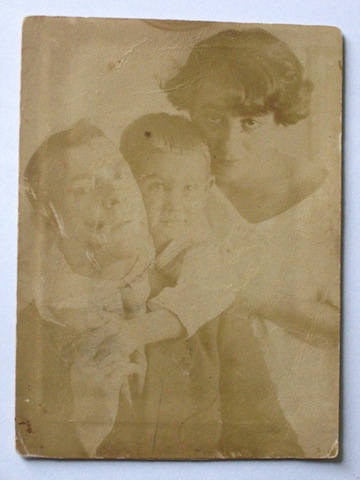
My father was born George Sisserman in Rostov-on-Don on 11th July 1917. His experiences in revolutionary Russia are contained on his mother Raichka’s page. The family finally arrived in England on 1st September 1923, when George was six years old.
Richmond Park 1925

“In Richmond. Mum, Dad, George & Dolly. 1927”
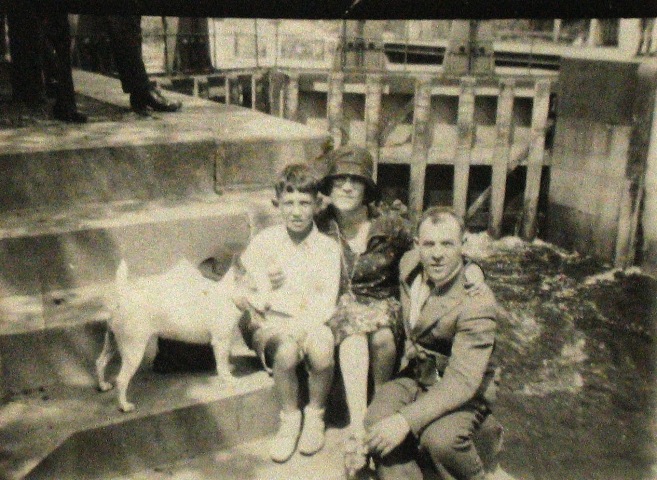
George attended Marylebone Grammar School from September 1926, when he was nine years old, until July 1935 when he was just 18.
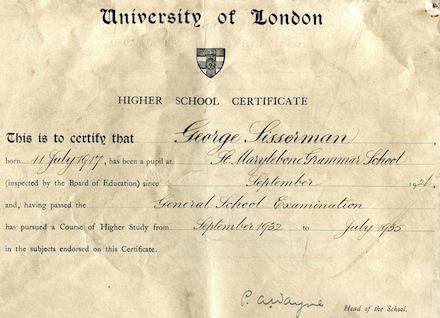
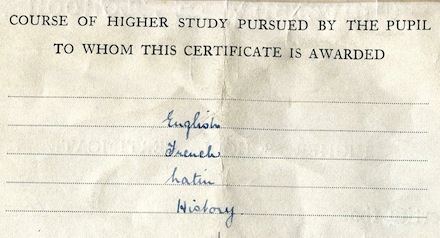
George’s school years coincided with the beginning of “the golden age of St Marylebone Grammar School” under the Headmaster Philip Wayne from 1923-1954.
Nora said:
And considering that he was born in Russia .. he didn’t know any English until he was six, his command of English was marvellous, I’ve got his book somewhere - he got prizes at school for English, he was very clever…… And he did very well at school, considering that he wasn’t born in England his English was very, very good and he was good at all the work. And in fact they wanted him to go to university. But by that time, you see, it was very hard – he had no father at home. [David Sisserman was in Australia]
….And about him at school, I even remember his headmaster’s name, the headmaster was Mr Wayne, and apparently .. She was very – Raichka was very, very sociable…. she was marvellously sociable and she got quite friendly with the headmaster .. And I think David used to teach the headmaster cello, before he went to Australia. He was very musical, and that’s why they had a rapport – she did with the headmaster because of the music.
…Ah now that was the thing, yes. Because the headmaster, Mr Wayne, they wanted him to stay and go to university. And Raichka would have liked him to go to university, he wanted to go to university. But Raichka would only let him go to either Oxford or Cambridge – she didn’t understand about other universities. Look, first of all, it was in a way new, only starting that people went to university, and in Russia … there was all the revolution going on. And because he didn’t get in to Oxford or Cambridge he didn’t go to university …
…Oh yes – and she did very well because she got him articled. You know that solicitors get articled .. She got him articled .. Now I can’t remember the name of the firm, but it was a good thing to do, it wasn’t a small firm, it was a big firm of solicitors – I think they were in the City, or somewhere not very far from the law courts. And it’s very good if you get articled in a big firm because they have different departments for all the different sides of the law: you might go into one where they only do conveyancing and then you’re lost about the other things. But I think he had a very good training there.
How Sisserman became Seymour
In 1930, while resident in Australia, David Sisserman became a naturalized British citizen; this naturalization extended to Raisa but not to George. In April 1933 (when George was 15) a document was issued by the Russian Refugees Relief and Travelling Permit Office in London, verifying the existence of an original birth certificate in Russia. Then in November 1934 (when George was 17) he became a naturalized British citizen:
Full name: George Sisserman
Address: 37 Greencroft Gardens, London NW6
Occupation: Student
Place and date of birth: Rostov-on-the-Don, Russia. 11th July 1917.
Nationality: Of no nationality.
Parents: David and Raisa Sisserman, or Zysserman. British.
In October 1935, when George was 18, he changed his name by deed poll, adding David as middle name.
Address: 10 St Andrew's Road, Golders Green, Middlesex.
Old name: George Sisserman
New name: George David Seymour
Nora said:
But when he hadn’t been there very long one of the bosses sent for him and said ‘Look ..we can’t have a solicitor ..’ It was a very posh English firm .. ‘We can’t have a solicitor with the name Sisserman. You must change your name.‘…. Because it didn’t sound English. You don’t know, in these City firms you couldn’t have a foreign-sounding name like that. Say if he’d become a partner, you wouldn’t perhaps go to a solicitor with the name Sisserman…..
He went home and told his mother…. Her story – I’m only telling you what she told me – I quite believe it and it was quite a good idea – she went for a bus ride, on top of the bus and looking at all the street names. And near Marble Arch there’s a street called Seymour Place and she thought ‘That’s a nice name!’ And it’s the same initial, it begins with ’S’, so he changed his name to Seymour – she told him to change it, you know.
The story we heard from George was that the name Seymour comes from the swimming baths in Seymour Place, down the road from his school on Marylebone Road, near Baker Street.
Bizarely, following the death of Isaac Moses Marsden in July 1884, an article appeared on 13th October in ‘The South Australian Advertiser’ about Jews who change their name:
Were I born a Levi, I think, so far from hurrying to get rid of my ancestral name, I should be proud of it. Compared with such a name, betokening such a lineage, how modern, obscure, and barbarous are such surnames as Howard, Stuart, or Seymour.“
(Thanks to Geoff Moss for this reference.)
George’s legal qualifications
While working as a solicitor’s articled clerk, George studied for a law degree as an external student at London University. In 1938, when he was 21, his 52-page book “The Conflict of Laws in a Nutshell” was published by Sweet & Maxwell, London. By that time he was already “G.D. Seymour LL.B”, having completed a law degree as an external student at London University while working in a firm of solicitors. (In his book George acknowledges his “friend and colleague” Moss Spiro.)
Completing his qualifications as a solicitor, George took the Final Examinations of the Law Society in March 1940. He passed with Distinction (as recorded in ‘The Times’, 6th April 1940).
Marriage to Nora
George met Nora Mayer on 31st October 1939. Nora said:
And I didn’t remember even what date it was. But one day when I was round at his place he said ‘Come in my room a minute, I want to show you something’. And I wish he’d kept it, I wish I’d kept it. He had the diary, you see it was 31st October 1939 when we met, and he said ‘I want to show you something in my diary’. And he opened his diary and on 31st October he’d drawn a heart with an arrow through it and an ‘N’ - that’s the day we met. If you’d said to me what date did you meet I’d never have known, I never would have remembered.
Nora recalled how George proposed to her:
He didn’t want to wait because he knew he would get his call-up papers any time. Six days after we married he got his call-up papers….. He didn’t really propose.. He said ‘Do you know what I did today?’ I said ‘No – anything special?’ And he said ‘I went to Caxton Hall and put our names down for getting married’. That’s how he told me! I said ‘What? You haven’t asked me!’ You know….
George put our name down at the Registry Office at Caxton Hall, quite a lot of people got married at Caxton Hall, and I rang my mother, because she was living, I think in Bournemouth, no, it was Worthing, and I told my mother, and she said it was all right to get married. She’d met George, and she knew we were very keen on each other. And then I suddenly got this phone call, and I’m glad I did, because George had put our names down at the Registry Office, because the war had started, and any time he could get his call up, and you have to give 3 weeks’ notice, and so my mother rang, and she said she’d been thinking about it, and she wanted us to get married in a synagogue, because my father wouldn’t have liked it if we hadn’t had a synagogue wedding. I said OK, I’ll see what George said. And he agreed, so she said, ‘Go and see the minister, at the New West End, where we got married’, I think he’d married them, so I made an appointment, and George and I went along one evening and saw, I can’t remember his name, but he was terribly nice, and he suggested that we went ahead and had the Registry Office wedding because it should be done soon in case George suddenly had to go in the army. And then we could just go and have the blessing in the synagogue.
So, a lot of Jewish people get married on a Sunday, so what we did, we got married at Caxton Hall on the Friday, and then I went back to where I was living, and he went back to his mother, and then on the Sunday we got married in the synagogue.
Wedding of George Seymour and Nora Mayer, 28th June 1940
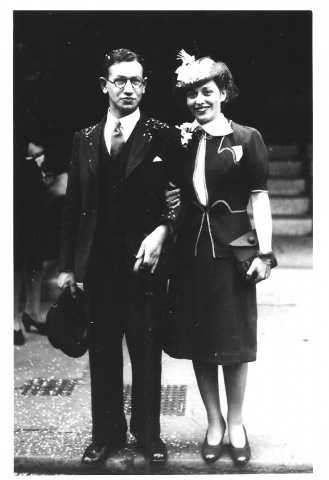
Nora’s grandfather had been associated with the New West End Synagogue from its foundation in 1877 till his death in 1929.
On the occasion of his wedding my father, who had been born George Sisserman, and changed his name to George David Seymour, signed documents “G. David Seymour”.
George’s father, David Sisserman, sent a telegram from Melbourne on 11th August 1940:

George in the Army 1940 - 1945 and Control Commission 1945 - 1947
Nora said:
.. About two days after we got back from our honeymoon he got his call-up papers. Really we were terribly lucky because he went all through the war and he was never in a battle, he was never on the fighting line…. He was put first of all …. on anti-aircraft … First of all of course he went miles up north somewhere – in Yorkshire – for training. Then he was put on anti-aircraft at Waltham Cross, out past Ilford [Essex].
… And then he got stationed in Wales, to Aberystwyth, that was what happened. And he was Quartermaster’s Assistant, you see. And the Quartermaster was a very, very nice man called Dennis Lloyd who later became a barrister. And I got very friendly with his wife [Ruth Lloyd], we were friendly with all the families. And I mean there was nothing much happening in Aberystwyth, so the commanding officer said to them “If you bring your wives up we’ll give you living-out passes”! So that’s … and Raichka came up with me….
After the war he did very interesting things. They realised that he still spoke Russian … and they used him with the Russian prisoners. Because the Germans had taken a lot of Russians prisoner in Europe and they all came over here and camped. And there was a camp up north somewhere, I think it was Leeds, that way – he was there as an interpreter, because most of the Russian prisoners couldn’t speak English at all…
In fact this work started before the end of the war. In January 1945 a Harrogate (Yorkshire) newspaper mentions Lieutenant G.D. Seymour, R.A.S.C. (Royal Army Service Corps), as being an interpreter to Russian prisoners of war in Ripon. (The Forces War Records web site lists George as a 2nd Lieutenant in the R.A.S.C. in 1943.)
Nora continued:
And then he got quite excited because they were taking a whole lot of them back to Russia, you see, on a boat, and Grandpa went as interpreter on the boat. He hadn’t been to Russia since he was six years old, so he was quite excited and … Have you not seen that box? Somebody on the boat made him that beautiful box. But it was very very hard in Russia in those days because there was the Bolsheviks and all this … And apparently – Grandpa used to get very upset, because quite a few of them committed suicide on the way back, they couldn’t face going back to Russia. It was very hard in those days in Russia….They were terrified of going back … George went on the trip, but the extraordinary thing was that they went to Odessa, which is where Grandpa was born [actually Rostov-on-Don], but he was not allowed off the boat – he wasn’t allowed on Russian soil, he had to stay on the boat.
This boat was part of the forced repatriation of nearly two and a half million prisoners of war and refugees to the Soviet Union, described as “one of the most tragic episodes of the twentieth century” by Charles Lutton in this review of ‘The Secret Betrayal’ by Nikolai Tolstoy, 1978. See also Victims of Yalta.
In June 1945 George was sent on a Bulgarian language course in London. On 3rd July 1945 he sent a telegram to Nora (at 8 Seaward Avenue, Bournemouth): “VERY GOOD NEWS AT MOTHERS TELEPHONE ME PERSONAL EVENING LOVE GEORGE”. Nora phoned George at Raichka’s flat (67 Rodney Court), then George wrote this letter:
… When I reported at the office in the morning I was told that I had been posted to the Control Commission, to the Russian section of the Interpreters Pool to be exact. This of course was a great relief, as I had already resigned myself to the prospect of going to India and perhaps just as acutely was dreading the period of inactivity in the desolation of Southend [Essex] which many people have to undergo while waiting for posting. I was given a warrant card and told to leave as soon as I could…. Anyway, we have always made up our minds that a job in Europe is the best thing that I can reasonably expect between now and the happy day when I shall never again have to leave my darling wife and family …
George’s appointment was just a month after the Berlin Declaration of 5 June 1945, signed by the supreme commanders of the four occupying powers, which “formally confirmed the total dissolution of Nazi Germany…. and the consequent termination of any German governance over the nation”, the four powers assuming supreme authority.
George arrived in Berlin some time between July 1945 and January 1946 (when the photo below was taken).
George in Berlin, January 1946; Nora in April 1947
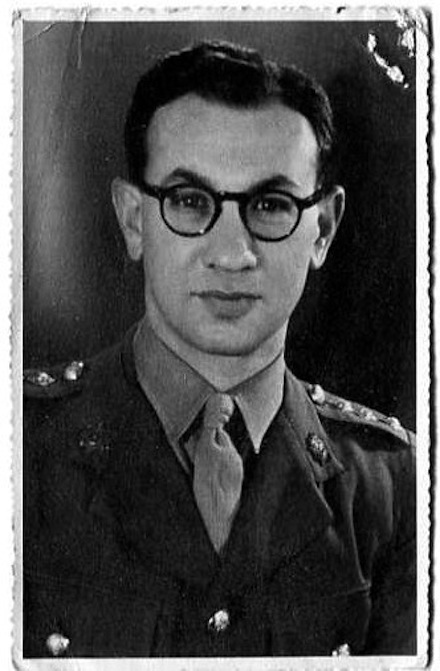
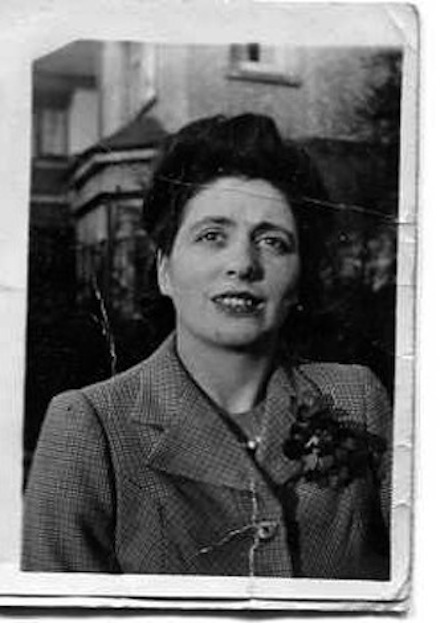
Later George was promoted from the Interpreters Pool. He had an unusual combination of qualifications: lawyer, British army officer, and native Russian speaker, and he was transferred to the Intelligence Corps with the rank of Major. Nora said:
What he did was … They had – I suppose you’d call it a kind of committee called the Kommandatura, with a ‘K’. The Kommandatura were putting the courts in order because after the war no German was allowed to practise as a lawyer until they’d been – they called it denazified and been before this committee….
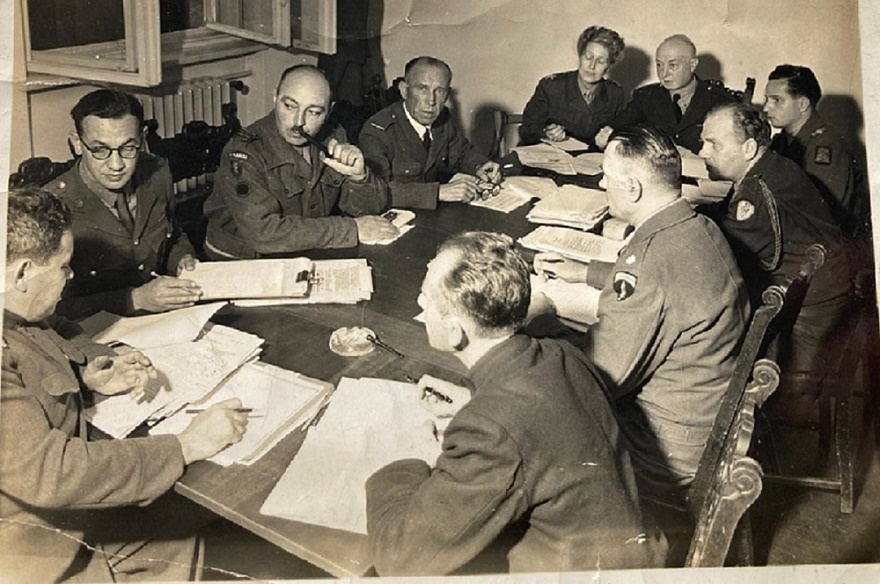
Denazification in 1946-47
The Wikipedia entry on Denazification draws in particular on Frederick Taylor, “Exorcising Hitler: The Occupation and Denazification of Germany” (Bloomsbury Publishing, 2011). Another source is Perry Biddiscombe, “The Denazification of Germany: A History 1945-1950” (Tempus, 2007). Thomas Harding, “The House by the Lake” (Heinemann, 2015) includes a case study of a denazification procedure in Berlin. The book by George Clare, “Berlin Days 1946-47” (Macmillan, 1989) is a facinating first-hand account by a young Jew whose family had fled Austria in the 1930s and who - like George - was posted as a British Army officer to Berlin in 1946, initially to the Interpreters Pool and then to a denazification committee (in Clare’s case a cultural committee). Lara Feigel, “The Bitter Taste of Victory: In the Ruins of the Reich” (Bloomsbury, 2016) is excellent, and includes examples of the trauma experienced by the occupiers.
The term ‘denazification’ was first used in 1943 by post-war planners in the U.S. Pentagon, referring to schemes for the forced reform of the German legal system. By the end of the War the Allies agreed on the need to coordinate policy in the regime of Occupation, and the main agency established for this purpose was the Control Council - a committee of Allied military governors. At the Potsdam meeting in July/August 1945 the Allies agreed on the denazification model proposed by the U.S. The legal system was now but a part of the objectives of denazification. The two “bibles” for denazification committees were “Control Council Directive No.24: Concerning the Removal from Office and Positions of Responsibility of Nazis and Persons Hostile to Allied Purposes”, 14th January 1946; and “Allied Kommandatura Order No.10: The Elimination of National Socialism and Militarism from Public and Economic Life”, 10th March 1946.
This broad definition of the objectives of denazification made it unrealistically ambitious. “At the war’s end, over 8.5 million Germans, more than 10 per cent of the population, were members of, or affiliated to, the Nazi Party….. Millions of Germans were asked to fill out a Fragebogen, or questionnaire. This six-page document … was then reviewed by a panel of inspectors, and if warranted, the subject of inquiry would be called in for questionning” (Harding, p.172-3).
It was necessary from the outset to moderate the ‘war guilt’ aspect of Occupation with ‘welfare of the governed’. Denazification involved the removal of huge numbers of people from their positions, including those with scarce skills, and military governors were unlikely to risk “the total collapse of society in an already bomb-battered country” (Biddiscombe, p. 31, p.41) Then came the famously harsh winter of 1946-47, when in Berlin “close to 60,000 people, mostly the elderly and the very young, died of cold and hunger” (Clare, p.176). There was a “sea change” in Allied denazification policy, due partly to the fact that in areas under Western control “the population was facing starvation and severe shortages of heating fuel by the winter of 1946-47”. The Marshall Plan was announced on 5th June 1947. “This large-scale and long-term endorsement of the ‘welfare of the governed’ theory boded ill for the denazification programme”, which had placed moral principle over administrative and economic efficiency (Biddiscombe, pp.74-75).
The second factor bearing on the 1947 shift in Allied denazification policy was the inception of the Cold War, and “the rising sense of enmity between the Anglo-Americans and Soviet Russia, which meant that each side increasingly came to regard Germany as an ideological battleground”. President Truman issued his ‘Doctrine’ on 12th March 1947; not surprisingly, there was no agreement at the meeting of the Big Four foreign ministers taking place at the same time in Moscow, and this “marked the effective termination of the ‘Potsdam era’ of attempted quadripartite control”. Even before 1947 U.S. Intelligence had recruited Nazi war criminals such as Klaus Barbie, and one U.S. leader is quoted as stating that “‘Nazism should no longer be a serious consideration from the point of view of national security when the far greater threat of Communism is jeopardising the entire world’” (Biddiscombe pp.75-77).
So the last months of George’s work on denazification of the German legal system took place in the context of the winding down of the programme. This is the background to George’s resignation in June 1947 and departure from Berlin in September. By March 1948 the Control Council collapsed, and in June 1948 the Berlin blockade began. Nearly all historians have concluded that “denazification failed …. Too much was attempted; too little succeeded ….. [Denazification] turned into a bureaucratic nightmare that bedeviled occupation authorities, hindered reconstruction, and gained the enmity of the German people … [A] proposition had been put forward that was almost bound to fail” (Biddiscombe, p. 145, p.217).
George’s family join him in Berlin
By the middle of 1946, some Control Commission and British Army officers in Berlin were being joined by their families. In our case, my mother, brother David and I started to have vaccinations in July 1946 in preparation for joining George, although we did not arrive there until December. Meanwhile there was controversy over the issue of British officers in Berlin being joined by their families, and this was expressed in letters to ‘The Times’ from 10th to 23rd October 1946. The initial letter was signed by a number of prominent women, the prime mover being Katharine Duchess of Atholl.
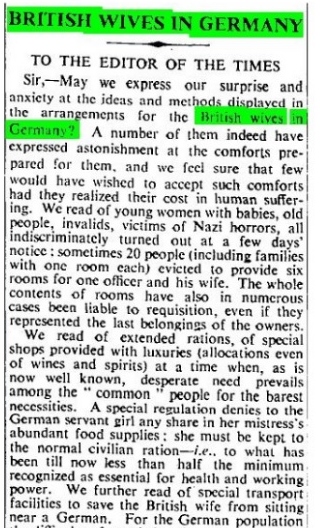
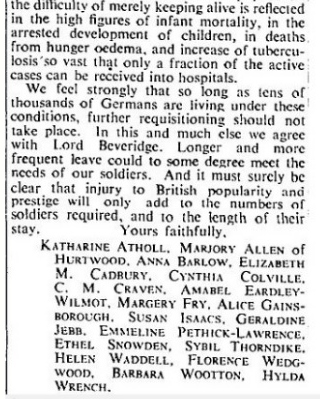
This letter was supported by Clementine, wife of Winston Churchill:
Sir,- I am sure that great numbers of thoughtful people will agree with the letter on “British Wives in Germany” signed by a number of distinguished women which appears in ‘The Times’ today. Your obedient servant, Clementine S. Churchill, 23 Hyde Park Gate, S.W.7., Oct 10.
But others took a contrary opinion (BAOR is British Army on the Rhine):
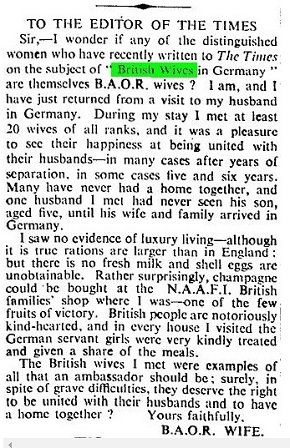
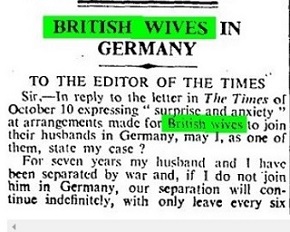
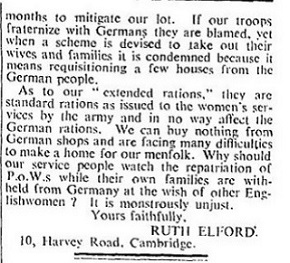
To which these rejoinders were published:
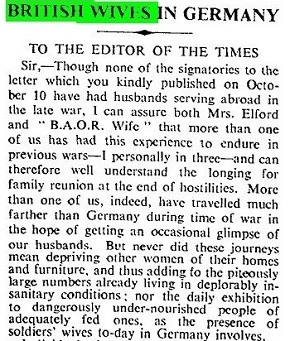
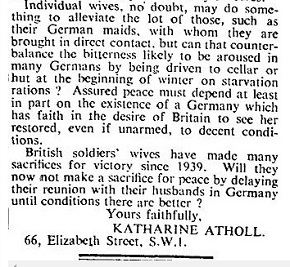
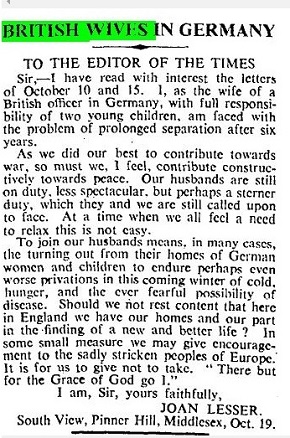
On arrival in Berlin on 9th December 1946 we moved initially into 26 PlatanenAllee, Flat 10, Charlottenburg. But Nora was not happy with what she later called the “horrible flat”, and the very next day George submitted a form with a list of complaints, which received this reply from Major F. Allen, Area Commandant, Green Howards regiment:
Your request for floor covering for hall and bedrooms cannot be fulfilled …. A local scale of furniture for Married Families is in force which supercedes the BAOR pamphlet to which you refer; under this scale no provision is made for hallways. Bedrooms are only to be equipped with one Rugs Bedside, when available …., so far, not one single rug has been made available for issue…. Families are permitted to have ONE single bed for each child, no bed is supplied when a cot is required in lieu. Beds and furniture for German servants cannot under any circumstances be issued. This is a Headquarters ruling. ….
To this letter Major Allen added a hand-written note: “The BAOR Pamphlet was issued as a guide only. Here, in Berlin, it is almost useless.”
On 24th February February 1947 we moved to a large house with garden at Frankenallee 1, in the same part of Berlin. On 8th March 1947 a friend in London, Ruth Lloyd (wife of Dennis Lloyd, the barrister who had been George’s commanding officer in Aberystwyth, and who later became Lord Lloyd of Hampstead) wrote from 264 Elgin Avenue, Maida Vale:
… Needless to say, I was delighted to hear from you again Nora and all the news of your present abode. I expect by now you are firmly established in the beautiful house you mention, which sounds absolutely superb in every respect and should be lovely for the children. I am also so glad to hear that you have been so fortunate with maids so that you can have all the assistance you require in the domestic sphere and can now avail yourself of the well-deserved rest and can really now enjoy yourself with George to your heart’s content….
This is the garden of the house in Frankenalee.
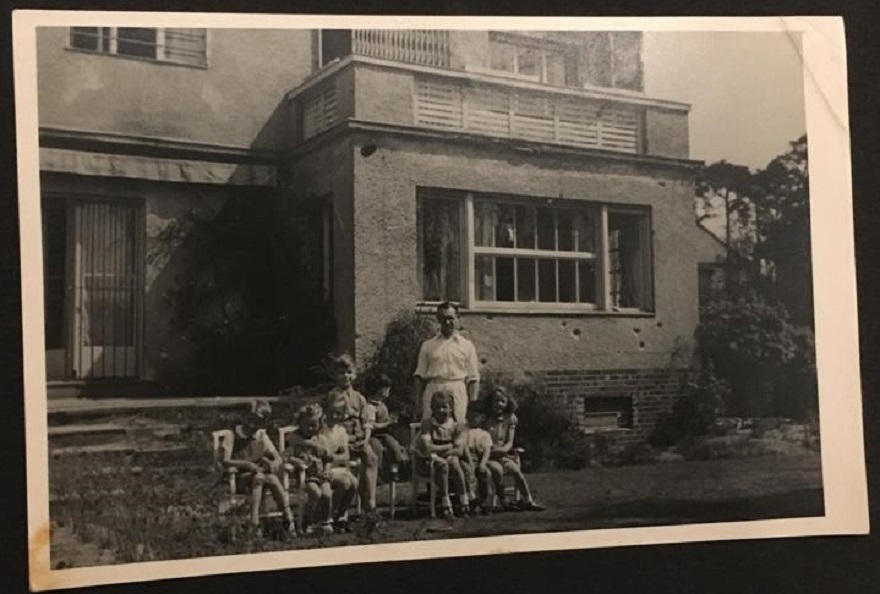
And this is the same garden in January 1994: my step-daughter Catherine Coombs (aged 9), son Isaac (9 months) and me.
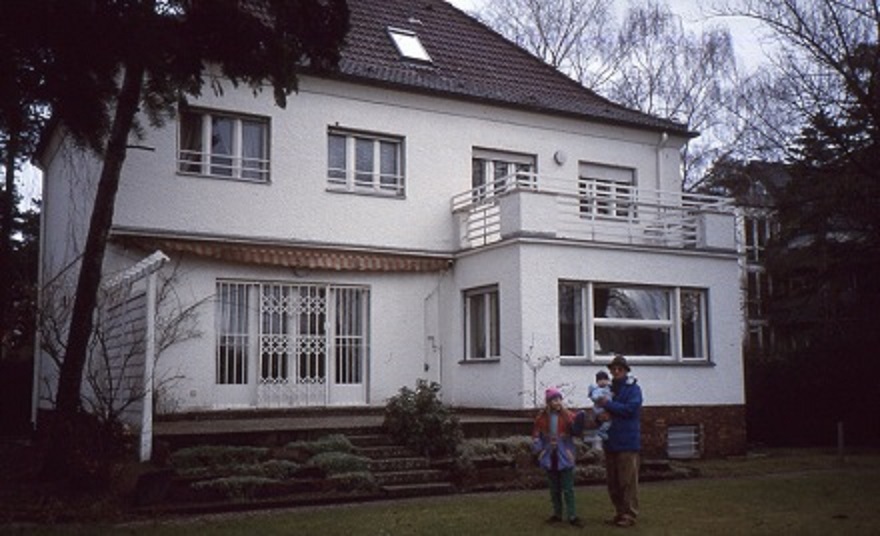
On 30th April 1947 Ruth Lloyd wrote again to Nora. George had visited the Lloyds while in London, and spoken about plans for us to emigrate to Australia:
… I have been so delighted to see dear George again … He looked remarkably well I must say, and your stay with him certainly seems to be agreeing with him more than ever … I only wish that I could see you all again, and now with your prospect of emigrating as George tells me I feel more miserable than ever about the whole thing and wonder when I shall see you at all? Mind you I think it’s an excellent idea for someone like you who really has no strong ties in this country for England is rapidly on the decline, and the prospects and comforts of life out in Australia have everything to be recommended, and it would be so much better for the growing boys, and I am sure that George will make his way with his excellent capabilities and zest for getting on to be able to give you the very best of everything!
… Through dear George I have also heard further details of your lovely home … I am so very glad to read from all your various accounts that you are having such a good time out there dear Nora and that you are really making the best of it for you really deserved it…. I received your sweet card from Brussels too …; George tells me that you anticipate going again … I did see Raya once, she came to see me and she was as effervescent in spirits as she is always and I always admire her for her marvellous disposition in that respect …
Nora spoke positively about her time in Berlin:
Well it was unforgettable, because we had a car .. . You see in the beginning all the officers – Grandpa was a Major by then – all the officers had cars. [But] they had so many car accidents, so they weren’t supposed to drive their own car, each one had a chauffeur – I even remember the name, Fennel. Grandpa’s German left much to be desired, my German was quite good still, I did German at school and I suppose I’ve got some German blood – but his Russian was excellent … But I always remember that when we had this driver, Fennel, the chauffeur, and he was German of course and all Grandpa could say to him in German was “Fennel, immer gerade aus!” Do you understand German? That means “Straight on!” “Immer gerade aus!” I used to be in hysterics, because all he could say was “Immer gerade aus!”
Nora and George visited Hitler’s Führerbunker at the Reich Chancellery, taking as a souvenir some fragments of a marble wall.
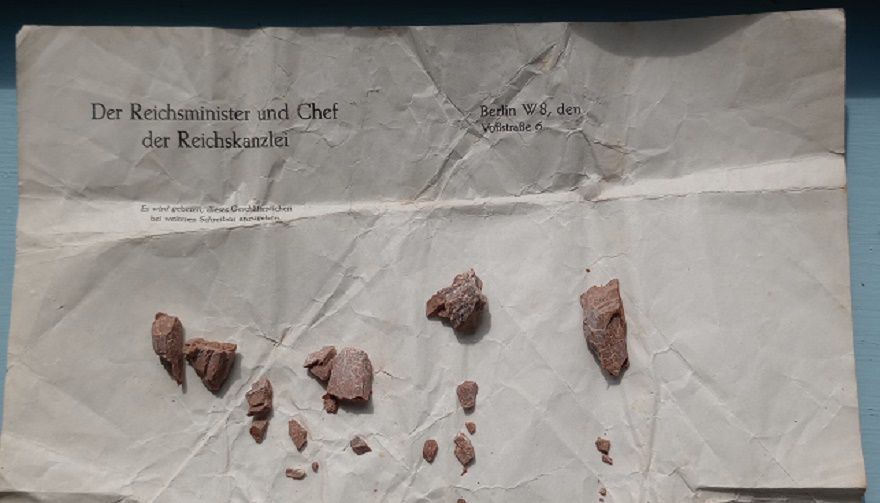
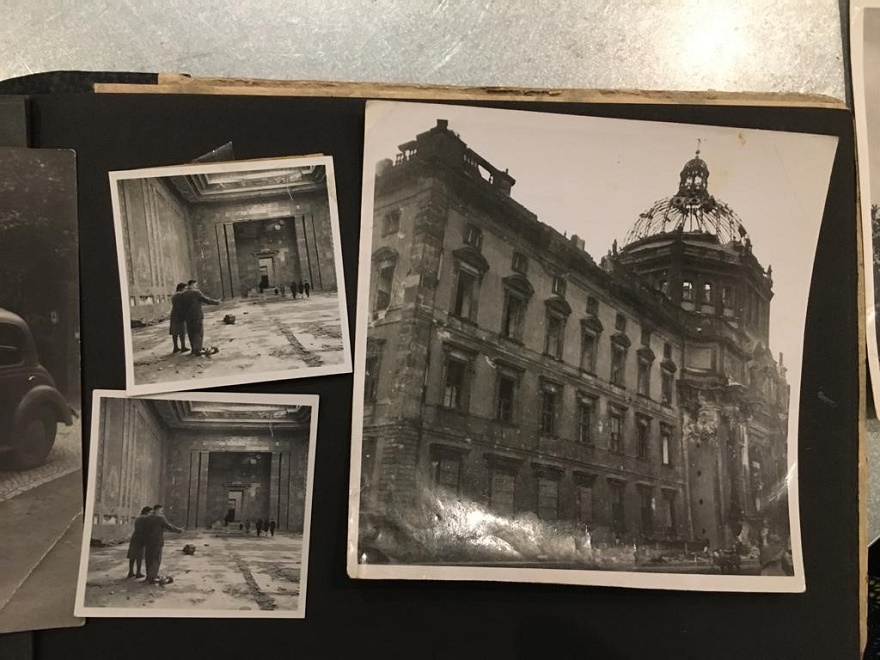
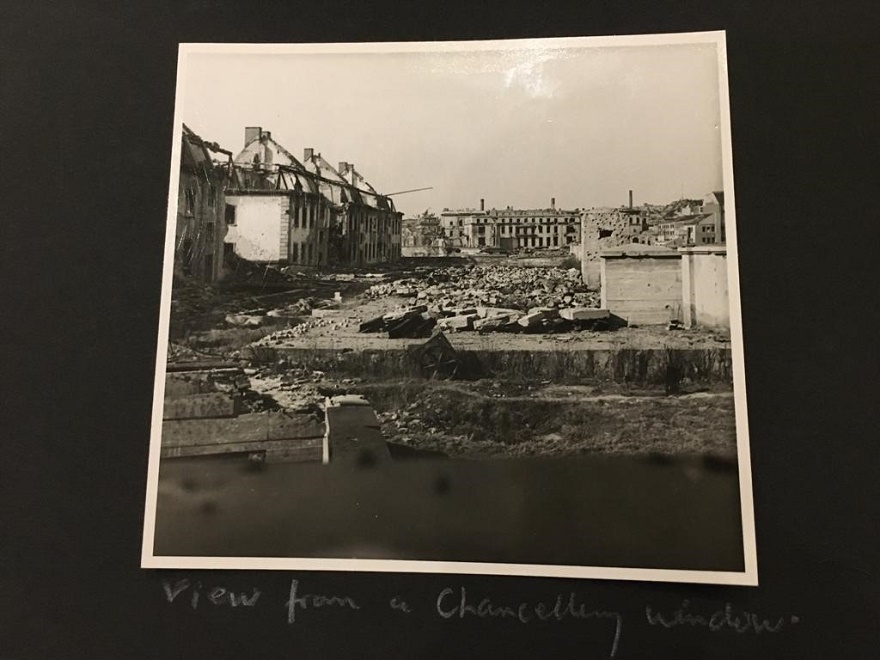

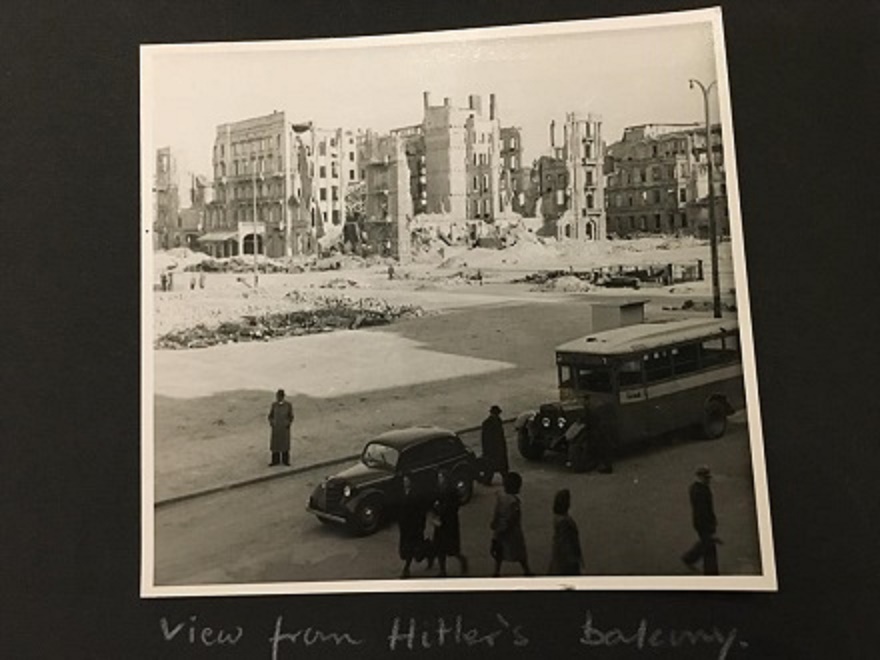
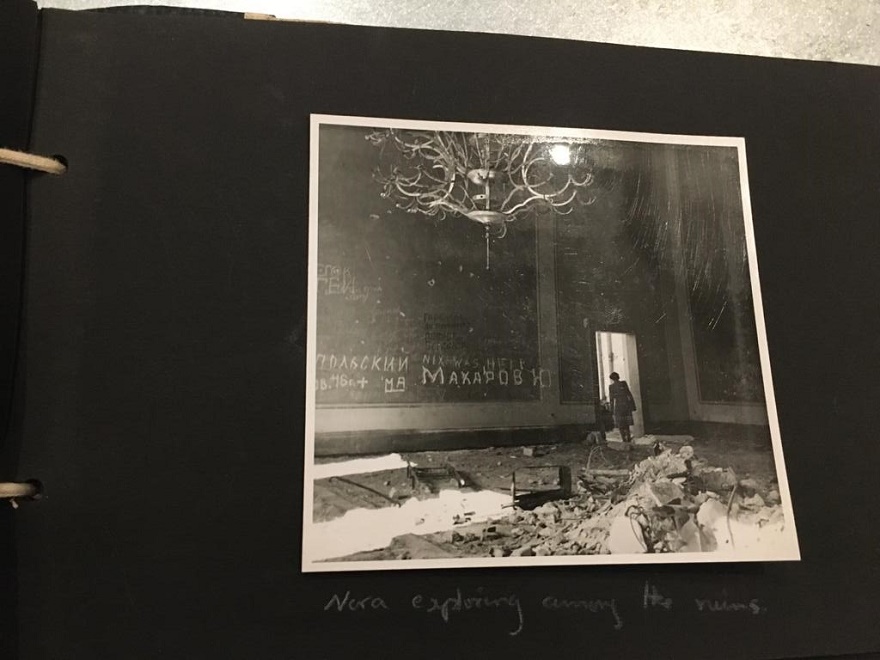

In June 1947 George resigned his position at the Control Commission. Nora received this letter from her Uncle Eugen (Mayer) dated 22nd June 1947. (Miss Mink was Eugen’s pet name for Nora: see Alfred Mayer’s page.)
My Dear Miss Mink and family, I am pleased to hear you are coming back in the near future. You have taken the right decision there can be no doubt about it, the papers report the Army has wasted about £59,000,000, so I think many of the luxuries of the army of occupation will be cut. There is plenty of work for the legal profession [in London]…
On 30th June 1947 at a meeting of the Charlottenburg Area [Army] Wives Committee, Nora stood down from the post of Secretary.
Interviewed in 2002, Nora spoke about the difficulties George encountered in his work at the Control Commission:
And really you should be very proud – I was and am, because he represented Great Britain …. he was a lawyer and it was terribly good that he could speak Russian … There were four representatives, Grandpa represented Great Britain and there was a man representing Russia, and there was a man representing the United States of America and there was a man representing France. The four of them and they met every week, and every month there was a different nationality in the chair …
You know I went there once - did I tell you? - when he was at the meeting. It was people applying to be allowed to practice as a lawyer, and the Russians – they were supposed to be our allies – but whatever … if Grandpa had said “Yes. I think that man …” They used to discuss all the case and then go round the table and ask everyone. And if Grandpa had said “Yes, I think that man should be allowed, he seems all right, he should be allowed to practise”, the Russian would say “No!”. You see. And if Grandpa said “No”, the Russians would say “Yes”. So Grandpa used to say the opposite of what he wanted because he knew what the Russians would say. You see. And in the end he said to me “I’m going to resign because I can’t work like that. If I can’t be honest …” Whatever he wanted he had to say he didn’t want!
And then when you sit round the table, you see … This man had come and the one who was in the chair discusses it all and then he goes round the table and he asks each representative – do they think he should be allowed to practise or not? And the American each time said “I’m with George! I haven’t got any papers, whatever George says – I’m with George!” Well that was very bad! And also the Russian interpreters were very bad, because George said something once and because he was representing Great Britain he had to say it in English. And he said it, and the interpreter translated into Russian – incorrectly! Because his English was terrible. And Grandpa kept repeating it, and repeating it … And in the end Grandpa said it in Russian, because the one who was in the chair, he would have got completely the wrong idea, the way this one was interpreting. Grandpa was doing a very, very good job….
Following George’s resignation in June he wrote a final report dated September 1947:
Mil Gov BTB Legal Branch. German Courts Section. Handing-over-Notes by Mr. G.D. Seymour.
…. Quadripartite Control. Appointment of Judges and Prosecutors and their promotion and transfer, the admission to practice of Lawyers, release from office and obligatory service of Lawyers as Judges or Prosecutors are questions which are regulated on a quadripartite basis. The immediate instrument responsible for these questions is the Legal Sub-Commission …. The expenditure of time and energy consequent upon the quadripartite administration of these matters is out of all proportion to the results achieved….
The Legal Sub-Commission was originally created as a Sub-Committee. During 1946 the status of a number of “unauthorized” sub-commissions was queried by the USSR commandant and for a time the position was farcical and obscure. In the outcome it was decided that … the LSC can send no instructions to the supervised German authorities but can only send formal recommendations … to the Legal Committee … The LSC is responsible to the Legal Committee for the routine administration of the German ordinary courts, particularly in personnel matters. Each judge and prosecutor is “vetted” both politically and professionally by the Kommandatura. The political vetting is carried out by the P & DN Committee. Thus each individual in this quadripartite, three-committee procedure passes through at least six stages ….
Unfortunately, under USSR pressure, a mass dismissal of 15 prosecutors classified as D.R.s was agreed to …. This rather wild shot not only dismissed one man who was dead and five who were not in fact working as prosecutors but also …. the Oberstaatsanwalt [Chief Prosecutor] of Spandau, Schilling. I am fully convinced that Schilling has never had any truck with the Nazis and should never have been dismissed …. he is a first-class man, and a pleasant personality, and should be most useful either to P.S. or ourselves. If we do not do something … he will leave Berlin.
Return to England in 1947
When George had visited Ruth Lloyd in London in April 1947 he had spoken of plans for our family to emigrate to Australia - plans which my grandfather David Sisserman was aware of. But George wrote again to his father on 6th September that we would settle in London after leaving Berlin.
On 19th September 1947 our family vacated the house in Frankenallee, the same day that travel documents were issued for Nora, David and myself (George having gone on ahead). Nora acquired sea-sickness pills, which were discovered quite recently.
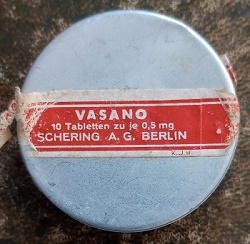
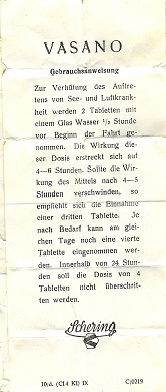

The fact that the manufacturers of our sea-sickness pills was Schering A G of Berlin is itself a testament to the failure of denazification. In 1938 Schering had bought the Scherk cosmetics company from its Jewish owner for a low price under the Nazi Aryanization policy. In 1942 a camp for foreign forced laborers was built on the factory premises. And the company participated in horrific “medical experiments” during the Nazi era.
The destination on our travel documents is Gerrards Cross. A friend of Raichka’s, Miss Hurst, had written to confirm arrangements in a letter dated 20th August:
Dear George and Nora, It will be all right for you to come Sept. 18th, or indeed any time in September…. Please be assured that I shall love to have you … and want you to be quite at home and happy - at home even though its only half a home…. So just come along as fast as ever you can, for it is time you were making a move and even now, this is a dear old country! With love to you all, Yours affectionately, S. Pleasant Hurst.
Sarah Pleasant Hurst (1877-1975) had met Raichka when David Sisserman taught her the cello, presumably while he was working at Middlesex College of Music, Uxbridge, from 1924 - 1928 (Uxbridge being near Gerrards Cross). Her house in Gerrards Cross was Cranstone, 9 Latchmoor Avenue, Chalfont St Peter.
But we did not go to stay at Miss Hurst’s house. Nora, David and I went to Bournemouth and stayed with friends - Norman and Dorothy Ross, at 58c Southbourne Grove - while waiting for the tenant to move out of our nearby house at 8 Seaward Avenue. George went to London, stayed with Raichka at Rodney Court, and took a legal job in the Civil Service, at the Board of Trade. Between 30th September and 7th November 1947 George wrote 18 letters to Nora, from which the following extracts are taken.
George refers here to his visits to the Harley Street psychiatrist “Miller”. This is Emanuel Miller(1892-1970), born in London of Russian Jewish emigre parents, founder of the Association for Child and Adolescent Mental Health, and father of Jonathan Miller.
(30th September) …Starting this on the train returning from Gerrards Cross where I went with mother in the evening… Miss Hurst was friendly as ever but there is something about the house which gives me the willies … It is large and badly lit, dismal and to my untrained eye would take a lot of looking after… I apologised profusely for all the inconvenience to which we had put her and the disruption of her plans, blaming the sudden change entirely on to your boils and run-down condition which made it undesirable for you to undertake housekeeping at present…. I then emphasised how we realised the value, both to ourselves and for our children, of our own home in Southbourne, and we were decided on your settling down there as soon as the tenant goes… So I am sure that it is going to work out as you wanted it to, and for the best…. I am convinced, after a visit, that you would not be happy in Gerrards Cross …..
I feel worst of all about the wasted time and effort which mother has put into the preparation of the house. She has been obliged to go down to keep Miss Hurst company many nights when she was tired after business and unpleasantness in Rodney Court, and I am sure it has told on her strength….
I got the account from the Control Office [Commission] for servants - £24 !! [equivalent to £656 in 2015]….. The suspense before beginning the [Civil Service] job, and the doubting whether I ought to take a gamble on private practice, are not good mental background for me… I wish I knew for sure if you agree that I have done the right thing about Gerrards Cross, and if you will be alright with Dot [Dorothy Ross] until the flat falls vacant…
(1st October 1947) …I have an awful feeling of brokenness and of having ended up our German escapade by breaking up and mismanaging everything. I feel awful about Gerrards Cross …. Worried when the flat [in Seaward Avenue] will actually be clear …. I will not pretend that I am enthusiastic about the immediate future, which looks like leaving us separated …. If the flat (when we get it back) is going to be satisfactory for the winter … then we must bear the separation, at least until I have made up my screwy mind on my future, and some alternative method of living is found …
… I miss you with that longing which I always experience when cut off from any set routine. It is just like those days when I first joined the army and could have cried my heart out with loneliness - but this time it’s somewhat bitterer because due entirely to my colossal inability to plan and make good decisions….
(4th October 1947) Yes, I have started the job. It is strange in the extreme, and too quiet and slow to enjoy … and in the absence of any adequate outside interests it is inevitable that I will continue to succumb to these attacks of depression. The present one is a beauty and you can imagine the grand time poor mother is having - in your absence she has been hearing all those sweet and interesting things about myself, and how I have, at 30, succeeded in mucking up my life and mind irreparably …. In the hope that a psychiatrist may be able to bring me to see the picture in some other light … I went to a doctor this evening …. who gave me the name of a Harley Street specialist …. I now, of course, wish I had gone to Hamburg - it’s exactly what we both foresaw, and were too weak and vaguely optimistic to overcome, that on coming to England I would have to spend precious money on treatment.
On Thursday evening I went in to Dennis Lloyd …. Dennis has been very lucky - deservedly - been appointed a Reader in Law at University College London at £1200 a year [equivalent to £32,800 in 2015] in addition to his practice!
(5th October 1947) … The financial and domestic troubles now form the main anxiety, of course. The feeling of being unsettled - just as unsettled as I always felt in Berlin because I wanted to be somewhere else, the job and life having turned out a disappointment …. I am convinced that our solution is to return to Rodney Court, letting the Southbourne flat, after Miss Douglas [the tenant] is out, for a further 6 months …. I know that I gave you a promise in Berlin that I wouldn’t suggest this - but I think you were mostly concerned with sharing with mother again. I have spoken to her and she willingly and gladly agrees to give us the whole flat, and will take a furnished room for herself somewhere in the neighbourhood … From Berlin it was difficult to envisage that it would be decent to suggest pushing her out of her own house, as it were. But having been here a fortnight I can clearly see that the carrying on of the work of the flat, and looking after lodgers, is repugnant and distasteful to her, and she will genuinely be happy with a place of her own, so long as she can see us occasionally….. I know Rodney Court has no garden, but the children should go to school in the mornings, and in the afternoons you can take them out. What other horrors are there of Rodney Court, if the in-law element is removed - as I undertake it will be. Mother agrees to find and move into her residence before you should move to Rodney Court - if you agree to the proposal. What is the alternative?
… But [important] above all is the maintenance of our family entity, and environment. I do not think Rodney Court is so bad at all … Millions of kids grow up in town, and I am sure it won’t hurt them for the winter. Then during the summer you can certainly go down [to Southbourne], at least for a couple of months …. We have a lot to be thankful for in having Rodney Court available to us. At least for a few months or years it can solve all our difficulties and be a home in which we can live and entertain our friends, who are touchingly anxious to see us re-installed in London ….. (Interruption on the telephone. Nora Fox produced a daughter this afternoon and both are well.) [Elenor or Nora Fox was the daughter of Bertha Fox, a Russian woman whom Raichka met on the street soon after arriving in London in 1923, when George was six: see Raichka’s page].
… I would like you to weigh up your reactions carefully - we have taken enough damn silly hasty decisions in the past eight years - and two days after you have begun thinking, write to me in reply … I don’t know whether the solution of our uncertainties will put an end to my depressions - I certainly hope so. But in any case, I am going to make an appointment with the specialist to whom I was recommended, and talk to him when in a good mood, fix terms, etc. etc. Then see him again for treatment if a mood sets in ….
(6th October 1947) Between depression and excitement over my brain-wave which, or so it seems at the moment, gives new hope and interest in my life, I have not attempted to give you any real picture of my work. Now after three-and-a-half days as a civil servant, I will attempt to do so…. The general impression is of extreme slowness, carefulness and no particular brightness. In my inferiority state, I doubted my ability to cope with the jobs I would be given to do. To-day I feel it is all child’s play …. It seems to me, in my bright state, that for a change I have made a wise move in coming into the civil service. I will have ample time, in every job I have to do, to refresh my memory on every aspect of the point… This is just like getting a scholarship grant, and, if we settle our living problems (see below) I feel sure that I will settle down and in a short time have gone through enough law and practice to feel able to go into [private] practice ….
… I fixed an appointment with the nuts-doctor for Tuesday week, 14th.
… The Ministry of Labour gave me a silly little answer to my letter about bringing over a maid - saying only that no applications are considered to bring over domestics of German nationality ….. I have sent them their letter back and said I wanted an answer about the D.Ps [Displaced Persons] … I am sure that if you offer the price you can always get a maid in London …. Robert has some good contacts in Ireland and perhaps we could get an Irish girl over …
… To me it seems worth an effort to create a place where one can be near one’s friends and relations and able to get the benefits of the entertainment and culture which is, after all, available here …. I can still see no reason why we shouldn’t be thoroughly comfortable in the flat here. We never thought of it before because we regarded it as mother’s flat, but I am entirely satisfied that she will be happier out of it …. Of course we will have to make her an allowance to pay for her room, but that is little compared to the value of having a flat in London for £3 per week.
(13th October 1947) I lunched with Alec Nove today and we discussed a number of interesting personal and business questions. It is definitely good to be back in London…..
Alec Nove, who became a noted authority on Russian economic history, was - like George - in the army during the war and then at the Board of Trade from 1947.
… I really enjoyed my week-end [in Southbourne] and feel we are at long last on the way to putting our domestic and financial selves on a sensible and sound footing. That makes me feel better than any treatment a psychiatrist could possibly prescribe: however, I will go to see Miller to-morrow as it is a good precaution …..
… Resuming on Tuesday morning - was delighted with your letter about Miss Douglas going without being pushed…. Palframan sent on the Frontier Control seizure note. I had a hunch they would pick on the big box, which was, of course, suspiciously heavy. They have sent a note saying they have seized: the typewriter, the record player, the little radio, the camera, 1 bottle of rum …. I have written a long letter to Harris [Charles Wyndham Harris, George’s commanding officer in Berlin] and hope it will be alright…. The certificate is to be given by the Head of Branch and if anyone will stretch a point, he will, I know. I think I did recommend you to take the typewriter with your 19 pieces of “hand” baggage? These mulish mares deserve all they get! [A play on Nora’s maiden name, Mayer.]
… Got the form from the Ministry of Labour. This seems harmless enough: you have to describe prolonged and fruitless efforts to find a British maid (or “suitable candidate from among British subjects”) and reasons for desiring to employ foreign labour. Five lines are allowed for an essay on these two themes. Please compose something suitable ….
I spent a very pleasant evening with Regina … The concert was excellent, very well filled: though I didn’t think the orchestra up to the Berlin Philharmonic, nor the soloist quite up to the standard of most of those we heard in Berlin. But I wouldn’t go back [to Berlin], for all that…..
I spoke to Ruth Lloyd this morning .. and gave her your message. She sounded really thrilled that you were coming back …. Will write again after seeing the nut-doctor. Going to lunch with Mr Spiro of Spiro & Steele (Conduit Street)…
(14th October 1947) Starting this waiting to go in to the bats-doctor… Had an excellent lunch with Moss ….. Soon he is moving into other premises further down Conduit Street … I am very glad I looked him up, as he has too big a practice … for himself; and wants to go away for a long holiday. But hasn’t looked around yet for anyone to carry it on …
… Had an excellent half hour with a first class man: nothing to worry about. Probably there will be no reason for anxiety or alarm from now on if our domestic arrangements are settled. But if I do get “down” seriously I can and should phone him for an immediate appointment. I feel the time and 4 guineas was well spent as now he has my background and has seen me normal; and if (as I am 99.9% confident will NOT be the case) treatment is necessary he can go straight at it …. He told me (not I told him) that unsettled domestic arrangements contributed to the extremity of my something-or-other phases (which is all that my trouble is).
(24th October 1947) I know I haven’t kept my promise to write to you, but I am so befuddled in my mind … that I have destroyed or held back efforts which I had committed to paper …. I pray you are not being worried by your knowledge of how I am and of the uncertainty it is producing…. Yes, Miller [the psychiatrist] was ill when he might have helped me. Just my luck or Destiny? I had dinner with Jacques [Grant] who has been wonderful, taking me out trying to distract and reassure me, in spite of my protest that I wasn’t fit company for anyone…..
.. The girls [tenants at Rodney Court] move out on 3rd November. I feel the responsibility and risk of the move, as you probably do: but still do not see that it is any worse than your wintering in Southbourne. I wish I knew your mind more clearly … Our “talks” when I am in a state, decide virtually nothing, and often leave me even more despondent, conscious of differences between us which we both refuse to recognise. I am tormented by the knowledge that it is my stupidity and lack of foresight over a period of years which has brought us to circumstances where our reserves are negligible if any and the breadwinner is unequipped mentally to meet his minimum obligations: what little mental equipment remains is unhinged by the gnawing anxiety over the future. All that can be done at the moment is for you to get the Southbourne flat ready and think seriously and for yourself whether, if I had to go away for treatment, you preferred to be there or in London. I was thinking that if (as I still do not believe) I had to go away, Ruth [Nora’s sister] might share Rodney Court with you?….
I will write more when I can think more clearly. But I would like you to write to me frankly, all that comes into your head without restraint. It’s the only way I will see your point of view…
(25th October 1947) I feel that I must have sent you a shocking letter yesterday: but believe me, I was in an awful state…. To-day for lunch mother invited Nora (late Fox) with her 3-week old baby. I of course felt I didn’t want to see anyone but ended up at the Foxes at 6.30 feeling a hundred percent better. Nora has an amazing fund of common sense and did more to convince me that my worries are imaginary than any psychiatrist could have done. Her principal achievement was to convince me that I am not the only person who is unable to concentrate after his war service: and that Berlin must have been as bad as any other kind of war service for that….
(27th October 1947) … I have “come to” now, and before my fatal self-confidence drives me to build you any more castles in the air, I want to say this much more on my “worry-bug” of finance … As I see it there is no sound alternative but a complete revision of the attitude towards buying which we have built up over the last years…. I feel - I hope wrongly - that it is going to be something which you will find difficult and resent…. I feel sure that the reason for my last fit of blues being so bad is the realisation that your attitude towards the idea of taking over Rodney Court showed all the characteristics of careless attitude towards spending which has brought us to the bloody financial state we are in now. I propounded to you the scheme of returning to London as soon as I realised that a winter in Southbourne for you spelt the end of our life together: and I seized on the Rodney Court solution … You were distinctly hesitant at first and then, it seemed to me, persuaded by the final picture of soon creating very comfortable - almost Ritzy - living conditions…. Where is our sense of values to attach to all these [material] things an importance high above that of elementary prudence and security? And if that is our attitude towards the furnishing of our home, are we to adapt the same line towards housekeeping, entertainment, servants, laundry, clothing, etc.? I thought I got a hint of that in “Liesel had £8 a week in Hayes” and other things - the maid, for instance….. I have always been too weak to refuse you anything … I am sure you will soon find someone to do the rough work … We will see about our maid from the DP camp (I still think this is a good move) …
Miller [the psychiatrist] is back at his consulting rooms and I had great pleasure in saying that I would call him if I needed him. It is clear beyond doubt that I brood because I get scared that we are not building up, and are not learning the bitter lessons of our past happy-go-lucky folly… Mother will get her things shifted to Mrs Fox’s … as soon as we get the date of your arrival.
(28th October 1947) The letter which I received from you today …. reassured me and gave me such confidence as I have not had in ages. I have been terrified that we had drifted, but now don’t believe it at all….. The girls [tenants] go on Monday, mother can go to Mrs Fox’s on Wednesday… If we do well, we would in due course look around for something a bit bigger, then mother could go back to the [Rodney Court] flat… She has been really wonderful during the past weeks - and I won’t have you saying she is doing it for her own ends because it simply isn’t fair or true!! She fully understands that the flat is to be ours for us to live our lives in and I don’t for a moment anticipate that you will have the least unpleasantness with her….
Am thinking more than ever about private practice, but will do nothing till we are settled in - one thing at a time.
(29th October 1947) … [Charles Wyndham] Harris should have left [Berlin] today… Goodman …didn’t know that I had started and was in Fuel & Power. I told him that I would be seriously looking for an opening with a firm … as I was sure the work [in the Civil Service] would not be personal or lively enough for me …. He said the situation in his firm with regards to the introduction of ‘fresh blood’ was unchanged… I am by no means going to bank on his vague proposition, but really am going to contact firms as soon as you are settled in if not sooner ….
(31st October 1947) The news is not much in quantity - but in quality. I lunched with Moss just now, and told him that I was definitely NOT made to be a Civil Servant and was looking round at once for an opening in private practice.. He wants a partner and we are both going to think during the next few days of an amalgamation of his capital, premises and clientele etc. with my energy and inexperience. I aim to see him again next week, but will decide nothing and take no definite steps until I have consulted you and [Dennis] Lloyd….. Lloyd (with whom I spent a pleasant evening yesterday) is still keen that I should go in with Goodman but a) G. is not ready b) there are many things about going in with Moss which attract me …. The future looks much much rosier now than it ever did… To celebrate the rosiness of the future, got 2 tickets for the ‘Barber [of Seville]’ on Sat. 15th - to end our first week together as Mr & Mrs Rodney Court Seymour ….
… How would you like to run a school like “Mrs Hoster’s” that you were always talking about? … You see I am completely nuts, so had better stop.
(2nd November 1947) Looking forward enormously to your arrival - am laying innumerable schemes for our installing ourselves in comfort and decency. Hope you will be pleased with it all. Anyway we have a full and busy life ahead and I am sure a happy one, working in our own way towards a common end….
(3rd November 1947) … Have decided … that St Paul’s (according to the Public Schools Year Book) is an extraordinarily good school, with a large number of scholarship vacancies. I think if we stay in the London area the boys ought both to go to Colet Court [prep school], as they would probably give them the best grounding for a St Paul’s scholarship. Although the Colet Court fees are heavy, it’s a very good gamble, which I am sure would come off with at least one of our swindlers ….
.. The girls [tenants] left, on good terms, leaving the flat to us ….. I will write to Jacques [Grant] and accept £200 from him, which we can repay at any time on a short notice by borrowing from the Woolwich [Building Society] … On Saturday mother will spend the afternoon and evening in her “flatlet” getting it ready, but will wait in Rodney Court for us to come from the station, and hand the flat over to you. I entirely agree that Ruth should take the boys out to tea, but think they should first come to the flat and let mother see them and show them their room. That is a little gesture of courtesy and appreciation which I think you will agree is called for….
Am going to the Heifetz concert this evening… There is much more varied entertainment here than we had in Berlin, and its cost is really very little.
(4th November 1947) … Mother was of course upset to hear that you proposed Ruth for nursemaid, but I told her flatly I wasn’t going to have any piddling pettiness or bickering as to who takes the kids out, when and where. On the other hand, I would be happier about it if I felt you were maintaining a fair balance. That’s for the future.
I am still very excited as to the prospects of going in with Moss. With his health, and his idea of going away, either on holiday or permanently, I feel he needs me, and I in turn can make a flying start with his existing staff, premises and clientele. As the scheme has definite interests and advantages for both of us, I think there is room to hope that it will come off … In the meantime I am not banking on it, and have now written six replies to advertisements. Will quite probably get one or two interviews and it will be interesting to find out what kind of offers one can secure….
It is perfectly plain … that we will need to raise some money in the very near future - we have about £50 in the bank at date, as far as I can see … This will not take us far, especially as I have to settle up with the Control Commission - I have lost count of how much I owe them but I think it is in the region of £50 including servants… It would certainly make all the difference to our budget if you could get some money in. I think one of the first things for you to do is look round for some reliable house-help, and then you can be free to do things which will be more profitable for the budget and, I am convinced, better for your outlook and personality.
(7th November 1947) Just a line to wish you God Speed on the journey…. I look forward greatly to the moment of your arrival. We will all drive to Rodney Court, and have a cup of tea to get over the excitement. Mother will go to her room soon after you arrive - she just wants to see the whole family in the flat. It may be a bit childish but life is made up of little things like that, and I am sure you will not regret making a gesture of appreciation. She has worked very hard to get the place clear. I went with her things to Mrs Fox’s before coming to the office so she will be able to go by taxi with the little odds and ends which remain to be taken….
Lunched again with Moss yesterday, and saw the place he is moving into to-morrow 48 Conduit Street. The negotiations are still very much on, and we are to go to them, provisionally, Tuesday evening for further discussions.
Legal practice in London 1947-1975: G.D. Seymour & Co.
George did take over the legal practice of Mr Moss: in June 1949 he wrote to his Aunt Sonya from his office at 48 Conduit Street, Regent Street, W1. In the 1950s he had a succession of premises in the West End of London, and appears in phone directories at 415 Oxford Street, W1 (1954), 68 Haymarket, SW1 (1955), and 59 Haymarket (1956). In the early days George’s articled clerk was Rex Cowan who, when we met in January 2016 at the Coffee Cup in Hampstead recalled that George was an excellent lawyer and a very good “master”. One of the highlights of their time together was the case of “Alexander v Railway Executive” (1951) which is cited as a precedent in “Smith and Keenan’s English Law” (Pearson Education Ltd, 2007, pp 790-791):
An ambiguous exclusion clause is construed against the party who put it in the contract.
Alexander was a magician who had been on a tour together with an assistant. He left three trunks at the parcels office at Launceston station [Cornwall], the trunks containing various properties which were used in an ‘escape illusion’. The claimant paid 5d for each trunk deposited and received a ticket for each one. He then left saying that he would send instructions for their dispatch. Some weeks after the deposit and before the claimant had sent instructions for the dispatch of the trunks, the claimant’s assistant persuaded the clerk in the parcels office to give him access to the trunks, although he was not in possession of the ticket. The assistant took away several of the properties and was later convicted of larceny (now theft). The claimant sued the defendants for damages for breach of contract, and the defendants pleaded the following term which was contained in the ticket, and which stated that the Railway Executive was ‘not liable for loss mis-delivery or damage to any articles where the value was in excess of £5 unless at the time of the deposit the true value and nature of the goods was declared by the depositor and an extra charge made’. No such declaration or payment had been made.
Held - The claimant succeeded because, although sufficient notice had been given constructively to the claimant of the term, the term did not protect the defendants because they were guilty of a fundamental obligation in allowing the trunks to be opened and things to be removed from them by an unauthorised person.
G.D. Seymour & Co had suburban offices at 20 Harrow Road, Wembley (1957-58) and 453b High Road, Wembley (1960-62). This may have been at a time when George was recovering from a phase of manic-depressive illness, although the Wembley office was run at one time by Elizabeth Craig while George and Rex worked in the West End office. In any case he was practising again in the West End at 45 Wigmore Street, W1 (1963) and 20 Queen Anne Street (1964), in the partnership of Seymour, Cowan, and Craig. As well as being George’s legal partner and former articled clerk, Rex was a family friend and indeed took some holidays with George and Nora. His father was joint founder of Cowan de Groot (Codeg), toy importers, wholesalers and distributors, and Rex used to bring us a box of toys direct from the warehouse.
In 1964 George had a mental breakdown, leaving unattended business which had to be suddenly taken over by his partners. This was to be the end not only of George’s West End legal career but of an important personal friendship. The trauma of the dissolution of his partnership with George was one of the factors which influenced Rex Cowan to leave legal practice in 1966. He became a shipwreck hunter, and after a 25-year association with the Dutch Government retrieving treasure from 18th century shipwrecks off the Scilly Islands he was made a Knight of the Orange Order in 1992.
From 1967 George’s office was at 47 Ealing Road, Wembley. By the mid-1970s his manic-depressive condition became so extreme that he was in hospital for about 9 months, and then had to retire aged only 58.
George in the Territorial Army.
In February 1954 George was appointed a Lieutenant in the Territorial Army (Intelligence Corps).
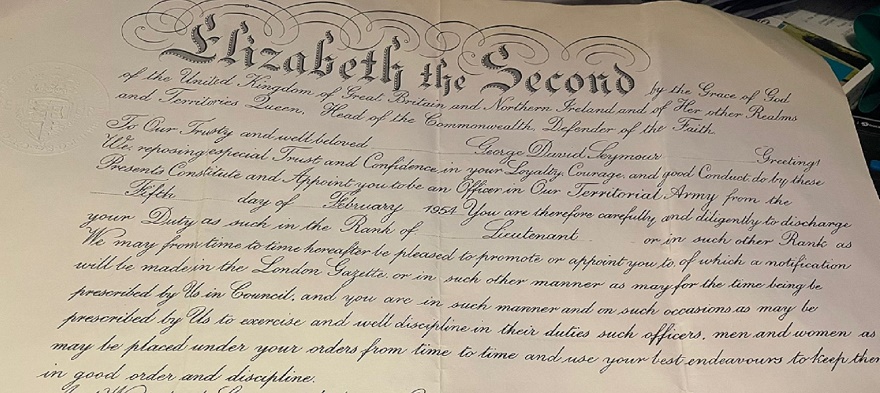


Left: Nora’s 70th birthday, 2nd December 1984. Right: George’s 80th birthday, 11th July 1997, at Kenwood Park, London. George died on 30th December 1997.
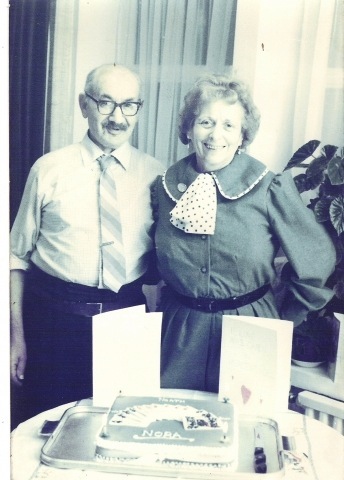
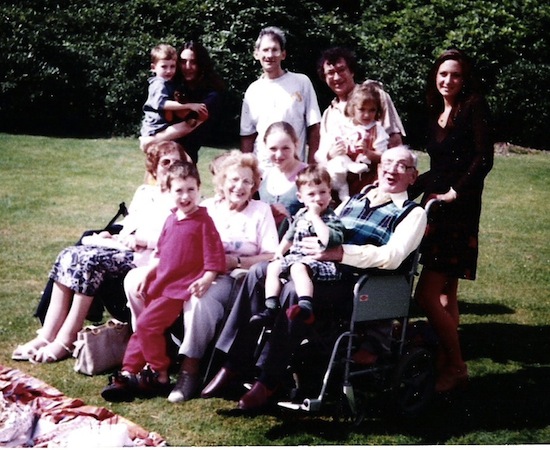
The link to Wells: Charles Wyndham Harris
When George was in Berlin from 1946-1947 his commanding officer was Charles Wyndham Harris from the Wells firm Harris & Harris. After leaving Berlin George maintained contact with Mr Harris for many years and knew that his office was located beside the Cathedral. Then they lost contact - the Christmas cards from Mr Harris no longer arrived.
Soon after I moved to Wells in 1990 George and Nora visited, and as we entered the East Cloister George’s eye was immediately drawn to the plaque: “Charles Wyndham Harris, 1909-1978. Chapter Clerk.”
The plaques in the East Cloister are for those whose ashes are buried in the Palm churchyard, though I have not been able to locate Mr Harris’ grave (it should be in the second row with those buried 1975-1980).
A bench beside the Bishop’s Palace moat remembers Charles Wyndham Harris as one of the founders of St John’s Ambulance in Wells.
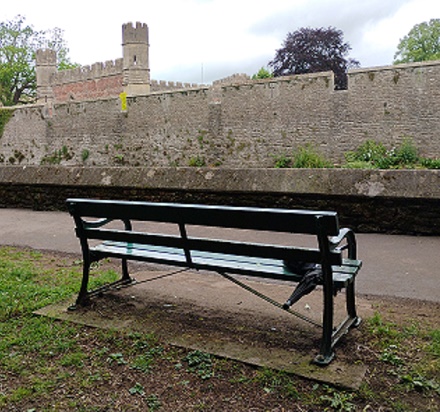
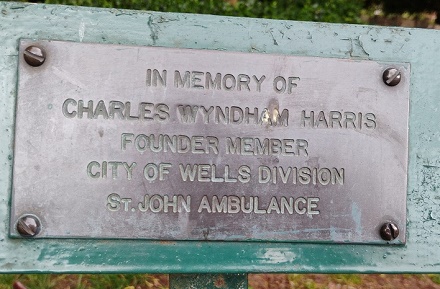
Page last updated 22 Nov 2025.